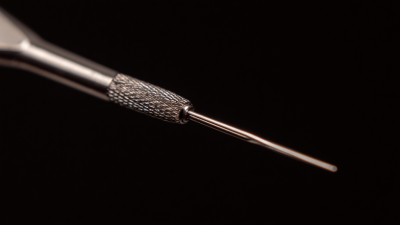You have successfully logged out.
Comprehensive Guide to Sourcing the Best Stainless Steel Suture Needles for Your Needs
When embarking on a journey to select the perfect stainless steel suture needles for your medical or crafting needs, understanding the myriad of options available can be daunting. Stainless steel suture needles are essential tools that play a crucial role in various applications, from surgical procedures to textile projects. This comprehensive guide aims to simplify the selection process by providing a well-structured checklist that highlights key factors to consider when sourcing the best needles. Whether you are a healthcare professional seeking reliable instruments or a hobbyist in search of the ideal needle for your projects, this guide will help you make informed decisions, ensuring you find the right stainless steel suture needles tailored to your specific requirements. Join us as we explore essential criteria, characteristics, and tips for selecting the highest quality needles that guarantee efficiency and precision in every use.

Understanding Different Types of Stainless Steel Suture Needles Available on the Market
When it comes to selecting the optimal stainless steel suture needles for surgical procedures, understanding the different types available is crucial for achieving the best outcomes. Stainless steel needles are favored in the medical field for their strength, corrosion resistance, and ability to maintain a sharp point. According to a recent industry report, the global surgical needles market is projected to reach USD 4.1 billion by 2025, underscoring the growing demand for high-quality suturing tools.
There are primarily two types of stainless steel suture needles: curved and straight. Curved needles, often used in deep tissues or anatomical areas with limited access, are designed to facilitate easier penetration and suture placement. Conversely, straight needles are ideal for suturing tissues that are easily accessible, allowing for precision and control. A study published in the Journal of Surgical Research highlighted that the choice of needle type significantly impacts suturing efficiency and tissue healing, demonstrating the importance of selecting the right needle for specific surgical applications.
Additionally, the size and shape of the needle play critical roles in ensuring effective suturing. Needles are categorized by their gauge and length; for instance, a smaller gauge needle (higher number) is often utilized for delicate tissues, while larger gauge needles (lower number) are suited for tougher tissue. Research by the American College of Surgeons emphasizes that optimal needle selection not only enhances surgery efficiency but also promotes improved clinical outcomes, reinforcing the necessity for surgeons to consider all aspects of needle design when sourcing suturing materials.
Stainless Steel Suture Needles Types and Sizes
This chart illustrates the availability of different sizes of stainless steel suture needles, showing the count of needles available per size in the market. Sizes range from 1 to 5, with Size 3 having the highest availability.
Key Factors to Consider When Choosing Stainless Steel Suture Needles
When selecting stainless steel suture needles, several key factors should be considered to ensure you choose the right ones for your specific needs. The type of surgical procedure you are performing is a primary consideration—different procedures may require different needle shapes and sizes. For example, curved needles are typically used in deep or hard-to-reach areas, while straight needles are better for shallow suturing.
Tips: Always assess the material quality of the stainless steel. High-quality stainless steel not only prevents bending and breaking but also enhances the needle's sharpness, ensuring a smoother and more efficient suturing process. Additionally, consider the needle's point design; taper points are ideal for soft tissues, while cutting points are necessary for tougher tissues.
Another critical factor is the needle size, which can impact the overall outcome of your procedure. Select a needle size that complements the suture thread diameter for seamless integration.
Tips: It's useful to have a variety of needle sizes on hand to accommodate different tissue types and healing requirements. Whenever possible, consult with colleagues or refer to surgical guidelines to make an informed decision.
Comparing Quality and Price: Finding the Right Balance for Your Needs
When it comes to selecting the best stainless steel suture needles for your specific needs, striking the right balance between quality and price is essential. High-quality needles can significantly impact surgical outcomes, ensuring precision and minimizing tissue trauma. However, premium pricing can sometimes become a limiting factor, especially for smaller practices or those operating under budget constraints. Therefore, it is crucial to evaluate not only the performance of the needles but also the cost-effectiveness they bring to your medical practice.
One way to navigate this balance is by comparing different brands and their respective product lines. Look for needles that offer durability, sharpness, and ergonomics without unnecessarily inflating the price. Reading reviews from fellow healthcare professionals can provide insights into real-world performance versus laboratory claims. Additionally, consider bulk purchasing options, as they often result in reduced costs per unit. By conducting thorough research and utilizing comparative analysis, you can ensure that your choice of suture needles meets both your quality standards and budgetary requirements.

How to Properly Maintain and Care for Your Stainless Steel Suture Needles
Proper maintenance of stainless steel suture needles is essential to ensure their longevity and effectiveness. First and foremost, it's important to clean the needles after each use. This can be done by gently wiping them with a sterile cloth or tissue to remove any residue or debris. Avoid using harsh chemicals that could damage the needle’s surface. Instead, opt for gentle cleaning solutions that won't compromise the integrity of the stainless steel.
In addition to cleaning, proper storage is crucial. Needles should be kept in a designated, clean, and dry area to prevent contamination and rusting. Using a needle holder or a dedicated case with compartments helps to prevent any accidental bending or damage. Regularly inspecting your suture needles for any signs of wear or corrosion is also important. If you notice any imperfections, it’s best to replace them to ensure optimal performance during procedures. By following these maintenance tips, you can ensure that your stainless steel suture needles remain in top condition, ready for use whenever needed.
Comprehensive Guide to Sourcing the Best Stainless Steel Suture Needles for Your Needs - How to Properly Maintain and Care for Your Stainless Steel Suture Needles
| Needle Type | Diameter (mm) | Length (mm) | Recommended Use | Maintenance Tips |
|---|---|---|---|---|
| 3/8 Circle Cutting Needle | 0.45 | 35 | Skin closure | Clean after use, store in a dry place |
| Straight Needle | 0.40 | 45 | Tissue penetration | Avoid bending, sterilize before use |
| Curved Taper Needle | 0.35 | 30 | Vascular and delicate tissues | Wipe with sterile cloth, inspect for nicks |
| Double-armed Needle | 0.50 | 60 | Closure of large wounds | Store in original packaging, keep out of moisture |
| Blunt Needle | 0.55 | 25 | Suturing friable tissues | Keep away from sharp objects, handle with care |
Where to Source High-Quality Stainless Steel Suture Needles Online and Offline
When sourcing high-quality stainless steel suture needles, it's essential to explore both online and offline avenues to ensure you get the best product for your needs. The global market for stainless steel surgical instruments is significant, with demand driven by the increasing number of medical procedures performed worldwide. In particular, the demand for stainless steel suture needles is expected to rise, reflecting a growing emphasis on quality and reliability in surgical tools.

Tips: When shopping online, look for suppliers that provide detailed product specifications and customer reviews. This can help you gauge the quality and performance of the needles before making a purchase. Additionally, consider joining medical forums or groups where professionals share their experiences and recommendations about various suppliers.
For offline sourcing, connect with local medical supply stores or surgical instrument distributors. These outlets often carry trusted brands and can provide immediate assistance. Engaging with professionals who can offer insights into product quality can also lead you to reputable sources for stainless steel suture needles. Remember, investing time in the sourcing process can significantly impact the success of your medical practice.
Related Posts
-

Mastering Import Export Certification for Best Suture Needles A Comprehensive Tutorial
-

Mastering the Essentials of Suture Needles for Effective Global Procurement
-

Excellence in Manufacturing: Discover China's Premier Suture Needles for Global Healthcare
-

Navigating Industry Standards: The Gold Standard for Best Suture Needles in Surgical Precision and Safety
-

Quality Suture Supplies from China Your Trustworthy Global Manufacturing Partner
-

Essential Surgical Suture Checklist: Key Points for Selecting the Right Type for Your Needs
